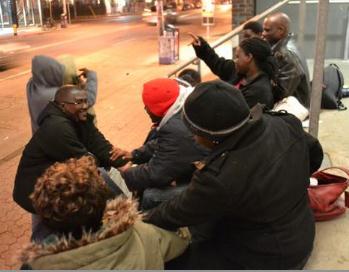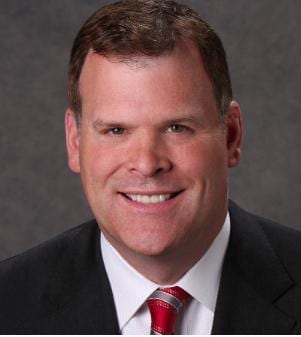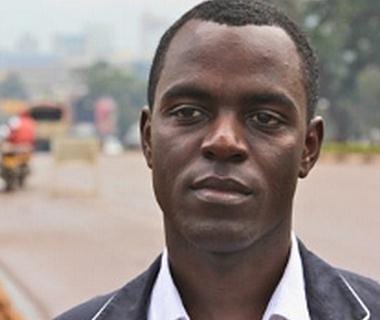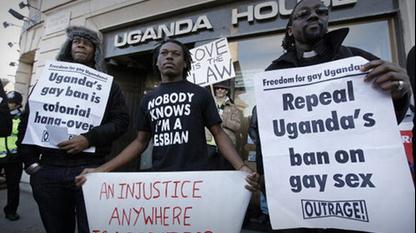
Members of Pride Uganda on the steps of Toronto's 519 Church Street at an emergency meeting about the "Kill the Gays" bill. Credit: Andrea Houston

Foreign Affairs Minister John Baird. Credit: Andrea Houston

Frank Mugisha, of Sexual Minorities Uganda (SMUG). Credit: Andrea Houston
Despite an international outcry, Ugandan parliamentarians are poised to pass a new anti-gay law — dubbed the “Kill the Gays” bill. Ugandan refugees in Canada say the legislation will be a “disaster” for gay Ugandans.
With the passage of the bill, the central African country will step up persecution of lesbian, gay, bisexual and trans people, says Brenda, a refugee from Uganda who attended an emergency meeting of Pride Uganda Nov 20 at the 519 Church Street Community Centre in Toronto. The group gathered to decide how Canada should best respond to the controversial legislation.
In order to protect them, Xtra has concealed the identities of the members of Pride Uganda, a Toronto-based group of queer refugees and their allies.
Brenda, whose refugee papers are currently being processed, is pleading for Canada to help queer Ugandans who need to escape. She never wants to go back.
“They will hunt down the gay people. They will kill them,” she says. “It will be a disaster. I’m not happy about it. It is really terrible.
“When that bill passes, most people are going to kill themselves because they can’t leave. In Uganda, gay people are always hiding. If they come out, they are always terrorized, always harassed, always hated . . . I’ll tell you the life gay people will lead. It will not be life anymore.”
Homosexuality is already criminalized in the country, but the proposed measure increases the penalties.
The bill is expected to pass easily, possibly as early as next week. It will then be in the hands of the country’s president, Yoweri Museveni, to sign it into law or veto it. If Museveni opts for a veto, the Ugandan Assembly could overturn it.
Tabled by MP David Bahati in 2009, the bill proposes longer jail terms for homosexual acts than already exist, including a life sentence in certain circumstances.
In its original form, those convicted of “aggravated homosexuality” faced the death penalty. The bill defined “aggravated homosexuality” as occurring when one of the participants is a minor, HIV-positive, disabled or a “serial offender.”
By late afternoon Nov 23, there was a glimmer of hope. The BBC reported that a committee of Ugandan MPs had decided to drop the death penalty and replace it with life imprisonment. The bill, possibly now with these amendments, heads to final debate in Parliament next week.
Activists in Uganda want the bill scrapped completely. Frank Mugisha, of Sexual Minorities Uganda (SMUG), condemns the bill and warns that, even if amended, gay people would still be at risk of facing the death penalty “in some circumstances.”
“Any parent who does not denounce their lesbian daughter or gay son to the authorities would face fines of $2,650 or three years in prison,” he states. “It places a total ban on public discussion of an issue whose existence cannot be wished away.”
Martin, coordinator of the emergency Pride Uganda meeting in Toronto, says the bill would prohibit all HIV groups that serve gay people in Uganda. That will have “a disastrous effect on the country’s HIV response, resulting in more HIV infections,” according to the International HIV/AIDS Alliance.
In addition, any of the offences contained in the bill can be applied to a Ugandan citizen who allegedly commits them — even outside the country. Martin says that section is particularly chilling for refugees in Canada who live in fear they may be sent back.
“So, as a gay man living in Canada, I would be breaking this law,” he says. “I hope the Canadian people see how it is affecting Ugandans back home, but I want Canadians to understand how it is affecting those who are here as well.”
Canadians can help by writing letters to their MPs, pressuring them to speak out to world leaders. “Whatever the Canadian government can do, please assist us,” Martin says.
The Centre for Inquiry, Canada’s humanist advocacy group, is planning a peaceful protest at the Ugandan High Commission in Ottawa Dec 3. All Out, the international gay rights activist organization, is circulating a petition.
SMUG’s Mugisha is posting frequent updates on his Twitter feed: @frankmugisha.
Canada recently expressed strong criticism to Uganda’s parliamentary speaker, Rebecca Kadaga. At the Inter-Parliamentary Union conference in Quebec City in October, Foreign Affairs Minister John Baird called on Uganda to respect and protect gay people.
Kadaga blasted Baird, accusing him of “forcing the people of Uganda to embrace homosexuality.”
“I was not aware that we had been invited here to promote homosexuality,” she said. Upon returning home, Kadaga promised to push for swift passage of the bill, “as a Christmas gift” to Uganda.
Baird did not respond to Xtra’s requests for comment, but his press secretary, Rick Roth, sent a statement. “The Government of Uganda must live up to its international obligations and protect all Ugandans from discrimination and abuse, regardless of sexual orientation.”
Roth also stated that Canadian officials have conveyed Canada’s concerns about the bill to Ugandan foreign ministry officials as well as to Uganda’s high commissioner to Canada.
Liberal MP Carolyn Bennett says Baird should have used more “diplomacy” with Kadaga.
It’s incredibly frustrating, she says. Many Canadians want the government to speak out and they applauded Baird for finally taking a strong position with Uganda. But Bennett says it seems Canada now shoulders the blame for speeding up the process.
“It’s very upsetting that this fast-tracking of the bill may be in reaction to what happened in Quebec City,” she says. “Diplomacy is supposed to be diplomatic. In many parts of the world, saving face is very important. We’re very, very worried. [Africa] is the next frontier in the GLBT rights movement.”
NDP MP Randall Garrison says Canada should proceed carefully. “We don’t wish to place the LGBT community at further risk in Uganda by precipitous actions.”
Brenda says she’s pleased to see Canadians are talking about this. She hopes to see more leaders offer support. In Uganda, activists take enormous risks in speaking out against the bill because it outs them, making them targets. Authorities raid press conferences and activists are terrorized. She says gay people are beaten in the streets daily, lesbians are “correctively raped,” and families are threatened.
“LGBT people are suffering,” she says. “They are in pain and they are crying out.”
Antonin, a refugee from Ghana who came to Canada in July, says he, too, can never go back. His picture and contact information were splashed over several websites after he attended a human rights conference in Geneva last year. That’s when his father tried to poison him.
“He wanted to eliminate me fast. My family completely rejected me,” he says. “With help, I was sent to the UN to save my life . . . When I first saw my picture on the net I wanted to commit suicide. I just wanted to end it.
“When the bill passes in Uganda, gay and lesbian people will live in fear and panic. They will be afraid to go out. And there will be no support for them because even groups that fight for the rights of homosexuals will be shut down. They will be put in prison.”
Another way for Canada to respond would be to open up its borders and make it easier for gay refugees from Uganda to seek asylum here, Garrison says.
“The most urgent thing we can do in Canada is ensure there is a safe haven available for people whose lives are in danger,” he says. “The problem is, the changes that have just been made to Canada’s refugee determination system make it particularly difficult for LGBTQ refugees.”
Refugees now have very short time-lines to put together a case and essentially prove to border officials that they are gay. “These are people who have fled a country where being out is dangerous. So they come here and within 14 days must out themselves to government authorities,” Garrison says.
“[Refugees] have to demonstrate that they are gay after coming from a country where demonstrating that they are gay will subject them to possible violence. That makes it very difficult to substantiate those claims.”
Federal Citizenship and Immigration Minister Jason Kenney did not respond to Xtra’s request for comment.
Liberal immigration critic Kevin Lamoureux, on the other hand, is speaking out against the bill, but he stopped short of calling for Canada to open its borders.
“We are talking about tens of millions of refugees that need asylum in the world,” he says. “In Uganda, we aren’t talking about dozens of people who will be directly affected by this. We are talking about thousands of people.”
He says Canada should continue to react by strongly condemning the bill to other governments around the world. “It’s hard for me to comprehend how, in modern-day society, we could have a country even contemplate legislation of this nature. This is just horrific.”
Many gay Ugandans put the blame squarely on American evangelicals who have been travelling to the African country and spreading negative messages about lesbian, gay, bisexual and trans people. It’s something SMUG’s David Kato tried to warn the world about before he was beaten to death in his home in 2011.
Kato’s name appeared on a list with other gay and lesbian people in a newspaper story under the headline “Hang them!”
At the time, Mugisha told the press, “The blood of David is on the hands of American preachers who came to Uganda. They share much of the blame for presenting us as less than human.”
Martin says American evangelicals remain the driving force behind the push for the bill’s speedy passage. “The church is working against the LGBT community.”
This will have a ripple effect throughout all of Africa, he says. “Other African countries are looking at what goes on in Uganda and trying to model after that.”
Most countries in Africa are intensely homophobic, Antonin says. Uganda is certainly not alone. “There is an attack every day . . . In Nigeria, there is a similar “Jail the Gays” law before Parliament. Look at Zimbabwe. Then there’s the North African Arab countries; those are very severe. Tunisia, Egypt, Libya, they have laws against homosexuality, [punishable] by killing and hanging.”
Antonin is urging Canada to pressure all countries in Africa to respect gay rights. “Talk to the key leaders in these countries. Tell them homosexuals are not evil. We are not outcasts. We are not criminals. We are part of society.”

 Why you can trust Xtra
Why you can trust Xtra


